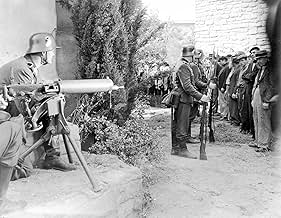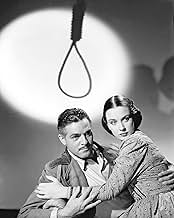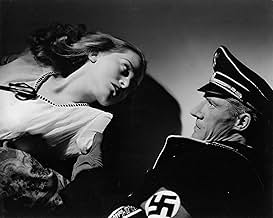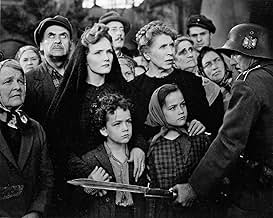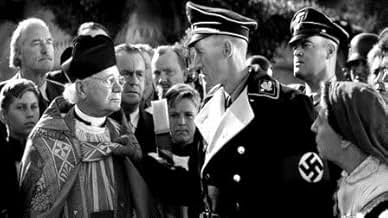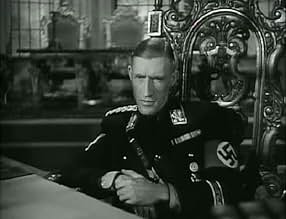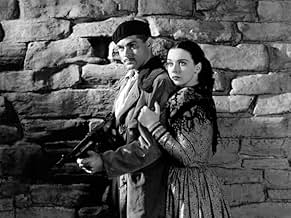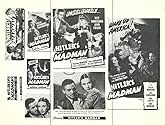Histoire de l'assassinat de Reinhard Heydrich, commandant SS nazi, par des partisans tchèques et des représailles infligées par les nazis aux Tchèques.Histoire de l'assassinat de Reinhard Heydrich, commandant SS nazi, par des partisans tchèques et des représailles infligées par les nazis aux Tchèques.Histoire de l'assassinat de Reinhard Heydrich, commandant SS nazi, par des partisans tchèques et des représailles infligées par les nazis aux Tchèques.
- Réalisation
- Scénario
- Casting principal
Ludwig Stössel
- Herman Bauer
- (as Ludwig Stossel)
Enrique Acosta
- Prisoner
- (non crédité)
Fred Aldrich
- German Machine Gunner
- (non crédité)
Nellie Anderson
- Old Lady Masaryk
- (non crédité)
Louis V. Arco
- German Sergeant
- (non crédité)
Richard Bailey
- Anton Bartonek
- (non crédité)
Wilmer Barnes
- Officer
- (non crédité)
Walter Bonn
- Military Doctor
- (non crédité)
Chet Brandenburg
- Linesman
- (non crédité)
Avis à la une
From his relatively safe base in England, Czech soldier Alan Curtis (as Karel Vavra) parachutes into his former hometown of Lidice, now controlled by bloodthirsty German Nazis. The village is a resource-rich riverside farming community, now helping to fatten Hitler's madmen. Hiding out and encouraging residents to support British allies through sabotage, Mr. Curtis reacquaints himself with glamorous schoolteacher Patricia Morison (as Jarmilla Hanka). While on his mission to bolster local resistance, Curtis is unable to resist Ms. Morrison's movie-star beauty. Their greatest obstacle is John Carradine (as Reinhardt Heydrich), an especially nasty Nazi called "The Hangman" and "The Protector" (of Hitler's Third Reich)...
This was director Douglas Sirk's first American film, after arriving from Hitler's Germany. He makes a great first impression on US shores and had, no doubt, some personal observations about Adolf Hitler and his fascist regime. The brutality is addressed more vividly in modern movies. Older films had to tone down the violence or omit it altogether in favor of gun-ho propaganda. Sirk manages to covey the horror without gore and tells the story exceptionally well...
"Hitler's Madman" is bogged down by the ill-placed Hollywood-style romance played by co-leads Curtis and Morrison. They are out of place, here, but the film's supporting roles are marvelous. The "Madman" in the title refers to Mr. Carradine. There are a couple others who would have made "Hitler's Madmen" a more appropriate heading. Carradine has several great scenes. So does gluttonous Ludwig Stossel (as Herman Bauer), the mayor inserted by the Nazis. And, while only seen briefly, Sirk has portly Howard Freeman (as Heinrich Himmler) primping memorably in a mirror while planning a slaughter...
From the obvious twists in Edgar Kennedy's showy alcohol-drenched hermit (Nepomuk) to the subtle revenge enacted by mournful German mayor's wife Johanna Hofer (as Magda), there are engaging characterizations. Yet, the story belongs to the "organizers and intellectuals" targeted by Hitler, and represented by veteran actor Ralph Morgan (as Jan Hanka). The father of leading lady Morrison, Mr. Morgan initially doesn't want to support the resistance because he believes his entire village could be destroyed. His character's journey is the one to follow and Morgan's "Jan Hanka" walks away with the film.
******** Hitler's Madman (6/10/1943) Douglas Sirk ~ Alan Curtis, Patricia Morison, Ralph Morgan, John Carradine
This was director Douglas Sirk's first American film, after arriving from Hitler's Germany. He makes a great first impression on US shores and had, no doubt, some personal observations about Adolf Hitler and his fascist regime. The brutality is addressed more vividly in modern movies. Older films had to tone down the violence or omit it altogether in favor of gun-ho propaganda. Sirk manages to covey the horror without gore and tells the story exceptionally well...
"Hitler's Madman" is bogged down by the ill-placed Hollywood-style romance played by co-leads Curtis and Morrison. They are out of place, here, but the film's supporting roles are marvelous. The "Madman" in the title refers to Mr. Carradine. There are a couple others who would have made "Hitler's Madmen" a more appropriate heading. Carradine has several great scenes. So does gluttonous Ludwig Stossel (as Herman Bauer), the mayor inserted by the Nazis. And, while only seen briefly, Sirk has portly Howard Freeman (as Heinrich Himmler) primping memorably in a mirror while planning a slaughter...
From the obvious twists in Edgar Kennedy's showy alcohol-drenched hermit (Nepomuk) to the subtle revenge enacted by mournful German mayor's wife Johanna Hofer (as Magda), there are engaging characterizations. Yet, the story belongs to the "organizers and intellectuals" targeted by Hitler, and represented by veteran actor Ralph Morgan (as Jan Hanka). The father of leading lady Morrison, Mr. Morgan initially doesn't want to support the resistance because he believes his entire village could be destroyed. His character's journey is the one to follow and Morgan's "Jan Hanka" walks away with the film.
******** Hitler's Madman (6/10/1943) Douglas Sirk ~ Alan Curtis, Patricia Morison, Ralph Morgan, John Carradine
This film story of the assassination of Reinhard Heydrich (titled by the Nazis as Reichs Protector of Bohemia and Moravia, by the Czechs as "The Hangman", and also one of the architects of "The Final Solution")and of the subsequent annihilation of the village of Lidice by the Nazis, really does not do justice to the subject. Although released by MGM, it was actually produced by poverty row Producer Releasing Corporation (PRC). Some of the cast members are old familiars and rather good, but none give a feeling that these are Czechs being murdered by Hitler's minions. As war propaganda, it is a success, and it at least gives the spirit of the tragedy of Lidice, if not historically detailed facts. John Carradine is effective as Heydrich, especially in his deathbed scene.
The facts about the assassination briefly are that two Czech partisans were parachuted into Czechoslovakia from an RAF plane. They managed to ambush Heydrich's open Mercedes, throw a bomb under it, and escape to a church. Heydrich died a few days later from complications arising from the penetration of his spleen by bomb fragments and debris from the car upholstery. Using torture, the Nazis discovered the whereabouts of the two partisans and the SS killed them at once. Lidice was picked more or less at random from among villages known to have anti-German leanings. On Hitler's orders, the men were shot and the women and children removed to camps, while the buildings of the site were levelled. When it became known in the allied world, this made excellent anti-Nazi propaganda, and more than one film was made of the subject. It may be that the massive retaliation backfired somewhat on the Nazis also by stiffening Czech resistance to the occupation.
The facts about the assassination briefly are that two Czech partisans were parachuted into Czechoslovakia from an RAF plane. They managed to ambush Heydrich's open Mercedes, throw a bomb under it, and escape to a church. Heydrich died a few days later from complications arising from the penetration of his spleen by bomb fragments and debris from the car upholstery. Using torture, the Nazis discovered the whereabouts of the two partisans and the SS killed them at once. Lidice was picked more or less at random from among villages known to have anti-German leanings. On Hitler's orders, the men were shot and the women and children removed to camps, while the buildings of the site were levelled. When it became known in the allied world, this made excellent anti-Nazi propaganda, and more than one film was made of the subject. It may be that the massive retaliation backfired somewhat on the Nazis also by stiffening Czech resistance to the occupation.
Back in the 1930s and 40s, several very small film production companies were known collectively as the 'Poverty Row studios'. This is because they made films with the tiniest of budgets and these outfits generally didn't even own studios but rented space on major studios' lots....filming after hours when the staff of the more prestigious studios were finished for the day. Among these tiny outfits was PRC--maker of some of the cheapest and worst films. of the day. However, something strange happened with its film "Hitler's Madman"....apparently it wasn't a bad film after all In fact, it got attention from the largest and most prestigious studio, MGM, and MGM bought the film and released it as one of their own!
The story is broadly based on the assassination of the Nazi governor of Czechoslovakia, Reinhardt Heydrich. Heydrich was among the most evil of all the Nazis, having come up with the plan known as 'The Final Solution', i.e., the extermination of all the Jews. And, because he was such an important figure to the Nazi regime that the people of Ledice, Czechoslovakia were liquidated in retaliation for this killing.
So is this film any good and does it hold up well today? Surprisingly, yes...it is very well made and effective...and still packs a powerful punch. Part of it is that although the film lacks stars (not unusual for a PRC film), it has some excellent and familiar character actors. Additionally, although the film plays a bit fast and loose with the facts, it actually sticks closer than you'd expect and the way the Nazis were portrayed was rather realistic...as most low-budget war films of the era tended to make the Nazis either stupid or ridiculously evil (more like Snidely Whiplash than a Nazi). Overall, I was impressed by this one....much of it because I just cannot believe PRC would be able to make a quality picture!
The story is broadly based on the assassination of the Nazi governor of Czechoslovakia, Reinhardt Heydrich. Heydrich was among the most evil of all the Nazis, having come up with the plan known as 'The Final Solution', i.e., the extermination of all the Jews. And, because he was such an important figure to the Nazi regime that the people of Ledice, Czechoslovakia were liquidated in retaliation for this killing.
So is this film any good and does it hold up well today? Surprisingly, yes...it is very well made and effective...and still packs a powerful punch. Part of it is that although the film lacks stars (not unusual for a PRC film), it has some excellent and familiar character actors. Additionally, although the film plays a bit fast and loose with the facts, it actually sticks closer than you'd expect and the way the Nazis were portrayed was rather realistic...as most low-budget war films of the era tended to make the Nazis either stupid or ridiculously evil (more like Snidely Whiplash than a Nazi). Overall, I was impressed by this one....much of it because I just cannot believe PRC would be able to make a quality picture!
Douglas Sirk's career is recalled for his wonderful colorful attacks on the "American Dream" in those films he made (usually with Rock Hudson, Jane Wyman, and Agnes Moorehead) in the 1950s. Never was the lusciousness of American prosperity used to show the underside of our wealth oriented culture. But Sirk had a long career in Europe and Hollywood before he made "Magnificent Obsession" and "Imitation of Life". His films in the middle forties included some superb costume films with George Sanders (like "Summer Storm")and this early one which really stars John Carridine as one of the most monstrous figures of World War II, Reinhard Heydrich the so-called "Protector" of Bohemia, who chaired the Wannsee Conference of 1941 that created the "Final Solution". Whatever degree of venom Carridine brings to the role is nothing like the effortless evil the original Heydrich dripped. Still it is a very effective performance.
The film is based, by the way, on the poem "Lidice" by Edna St. Vincent Millay. Written shortly after that village was decimated in the reprisals following Heydrich's death, it is recited (in a woman's voice) in most of the film, but it's closing lines are recited by the male actors at it's conclusion - quite effectively as most of these actors (Edgar Kennedy, Jimmy Conlon, Ralph Morgan) have been slaughtered by the Nazis in front of us. As some of these actors (Kennedy and Conlon) usually were seen in comedies, their use as straight dramatic actors in this film is a revelation of what they might have done if they had not been used in comedy so much.
To me the best moment of this film (aside the use of the poem) is when Carridine lies dying in a hospital, visited by Howard Freeman as his comrade and fellow S.S. bigwig, Heinrich Himmler. Freeman was an affective actor in comic and dramatic parts, and here shows the hideous Himmler as a banal Babbitt bureaucrat. Perhaps not quite correct historically (Himmler was stranger than George Babbitt) but in it's way quite effective. Carridine had (in his characterization) shown something of the intellectual pretensions of Heydrich, but as he is dying he suddenly realizes he is frightened of dying. He tries to explain this to Himmler who doesn't care (so much for being a fellow Nazi comrade) and only sees the mission of the dying Heydrich to become a martyr to stiffen German will to victory. As Carridine finally dies, Freeman only sees his duty to make a large enough retaliation on the local population so that people will realize that he is harder than the dead martyr ever was.
Historically this is not accurate either. Heydrich had been in high level Nazi planning for several years, and frightened not only Himmler as a rival, but Bormann, Goebbels, and Hitler himself. Heydrich had a nasty "rumor" in his past: his father, a musician, may have been descended from Jews. This was never settled. However, due to this particular rumor, Heydrich's opponents felt they could control him. In actuality, it was easier to control an out of control Mercendes Benz. As soon as he could, Heydrich began collecting information on every one of his rivals about their family backgrounds (including Hitler's). It was his eventual determination that he would one day be the successor of "Der Fuhrer". Himmler, Hitler, and the others may have officially honored Heydrich as a national martyr, but in their own private moments they all were fully glad to see that he was dead and out of the way.
Their real reason for the massive retaliation was the fear of copycat plans. The Czechs who killed Heydrich were trained in London, and had Churchill's assent on their plot. No doubt, had they gotten away with it, plots against other Nazi big-wigs would have been set in motion. The retaliation was to remind the local populations that the Germans would not hesitate to depopulate them if anymore assassinations occurred. It was also a reminder to the Allies that if they wanted to save lives they better not plan any further killings. As such it worked. Although several plans for an attack on Hitler were finally set up, none were ever put into operation (the 1944 bomb plot was by the German General staff, not by Churchill). Whether this was wise or not is a matter we cannot ever tell the answer to.
Heydrich's actual death is nothing like the hideous death camps he set up for Jews, Gypsies, Slavs. etc. But it still is somewhat pleasant to think of the agony of his last days, his spine broken by the steel springs of his exploded car seat. The affection that his title "Protector" supposedly suggested is truly shown by a story of how a German soldier desperately tried to get passers by to assist to help move the "Protector" to a nearby hospital quickly. An unknown Czech citizen looked at the dying man in the ruins of his Mercedes, shrugged his shoulders, and said, "The hospital is around the corner. He could walk there." Then he left the flustered soldier.
The film is based, by the way, on the poem "Lidice" by Edna St. Vincent Millay. Written shortly after that village was decimated in the reprisals following Heydrich's death, it is recited (in a woman's voice) in most of the film, but it's closing lines are recited by the male actors at it's conclusion - quite effectively as most of these actors (Edgar Kennedy, Jimmy Conlon, Ralph Morgan) have been slaughtered by the Nazis in front of us. As some of these actors (Kennedy and Conlon) usually were seen in comedies, their use as straight dramatic actors in this film is a revelation of what they might have done if they had not been used in comedy so much.
To me the best moment of this film (aside the use of the poem) is when Carridine lies dying in a hospital, visited by Howard Freeman as his comrade and fellow S.S. bigwig, Heinrich Himmler. Freeman was an affective actor in comic and dramatic parts, and here shows the hideous Himmler as a banal Babbitt bureaucrat. Perhaps not quite correct historically (Himmler was stranger than George Babbitt) but in it's way quite effective. Carridine had (in his characterization) shown something of the intellectual pretensions of Heydrich, but as he is dying he suddenly realizes he is frightened of dying. He tries to explain this to Himmler who doesn't care (so much for being a fellow Nazi comrade) and only sees the mission of the dying Heydrich to become a martyr to stiffen German will to victory. As Carridine finally dies, Freeman only sees his duty to make a large enough retaliation on the local population so that people will realize that he is harder than the dead martyr ever was.
Historically this is not accurate either. Heydrich had been in high level Nazi planning for several years, and frightened not only Himmler as a rival, but Bormann, Goebbels, and Hitler himself. Heydrich had a nasty "rumor" in his past: his father, a musician, may have been descended from Jews. This was never settled. However, due to this particular rumor, Heydrich's opponents felt they could control him. In actuality, it was easier to control an out of control Mercendes Benz. As soon as he could, Heydrich began collecting information on every one of his rivals about their family backgrounds (including Hitler's). It was his eventual determination that he would one day be the successor of "Der Fuhrer". Himmler, Hitler, and the others may have officially honored Heydrich as a national martyr, but in their own private moments they all were fully glad to see that he was dead and out of the way.
Their real reason for the massive retaliation was the fear of copycat plans. The Czechs who killed Heydrich were trained in London, and had Churchill's assent on their plot. No doubt, had they gotten away with it, plots against other Nazi big-wigs would have been set in motion. The retaliation was to remind the local populations that the Germans would not hesitate to depopulate them if anymore assassinations occurred. It was also a reminder to the Allies that if they wanted to save lives they better not plan any further killings. As such it worked. Although several plans for an attack on Hitler were finally set up, none were ever put into operation (the 1944 bomb plot was by the German General staff, not by Churchill). Whether this was wise or not is a matter we cannot ever tell the answer to.
Heydrich's actual death is nothing like the hideous death camps he set up for Jews, Gypsies, Slavs. etc. But it still is somewhat pleasant to think of the agony of his last days, his spine broken by the steel springs of his exploded car seat. The affection that his title "Protector" supposedly suggested is truly shown by a story of how a German soldier desperately tried to get passers by to assist to help move the "Protector" to a nearby hospital quickly. An unknown Czech citizen looked at the dying man in the ruins of his Mercedes, shrugged his shoulders, and said, "The hospital is around the corner. He could walk there." Then he left the flustered soldier.
An interesting movie that does not do much to inspire the viewer through its portrayal of the Czech resistance, though they face a grim ending, but definitely catches the interest in the portrayal of Nazi brutality through the part played by John Carradine as Reich Protector Heydrich, who routinely had people shot in order to maintain a level of fear and control. The characterizations of the townspeople are too quaint for this subject, but they (the townspeople) do catch on as Carradine's brutality increases, with the most memorable scene being when he and his men take over a philosophy class, in a scene that manages to get fairly intense. If it were just up to Alan Curtis to carry the film as Karel Vavra, the film would fall into a dark pit of boredom, since within any resistance movement there is always collaborators within families that need to be killed. Those characters are all left out, and so the drama quotient is not very intense. Nonetheless, Carradine's Heydrich is definitely worth watching.
Le saviez-vous
- AnecdotesWhile in Germany before the war, director Douglas Sirk met Reinhard Heydrich at a party, and later recalled that "he made my blood run cold."
- GaffesHeydrich was ambushed in the city of Prague, not on a country road. His travel plans were also no secret: despite Hitler's admonitions Heydrich always took the same route when traveling in the city, believing the the people were too cowed to dare attack him.
- Citations
[last lines]
Anton Bartonek: Telling you not to eat or drink. one morsel of food, one swallow of drink, before you think, Before you think! What is best for your country. Keep your country free from the foe you hate. Catch him! Catch him! Do not wait!
- ConnexionsFeatured in Hollywood et la Shoah (2004)
Meilleurs choix
Connectez-vous pour évaluer et suivre la liste de favoris afin de recevoir des recommandations personnalisées
- How long is Hitler's Madman?Alimenté par Alexa
Détails
- Date de sortie
- Pays d’origine
- Langues
- Aussi connu sous le nom de
- Hitler's Hangman
- Lieux de tournage
- Angeles Crest Highway, Angeles National Forest, Californie, États-Unis(exterior snow scenes)
- Sociétés de production
- Voir plus de crédits d'entreprise sur IMDbPro
Box-office
- Budget
- 300 000 $US (estimé)
- Durée1 heure 24 minutes
- Couleur
- Rapport de forme
- 1.37 : 1
Contribuer à cette page
Suggérer une modification ou ajouter du contenu manquant

Lacune principale
By what name was Hitler's Madman (1943) officially released in India in English?
Répondre
